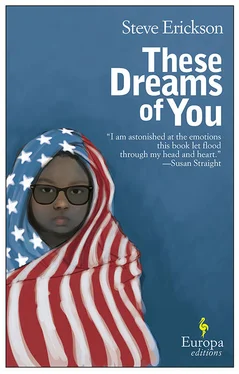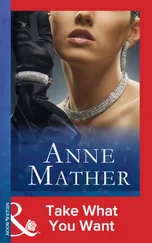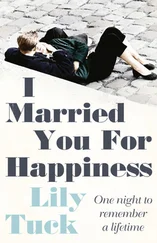“The heck?”
Zan is shocked by the tactlessness of the conversation, but it’s history that’s been tactless. “The father was ambassador,” he says, looking at the house, “before World War II. One of his sons became president. He was shot. A few years later his brother ran for president and he was shot too. Some people think the new president’s campaign was more like the brother’s.”
“Would the brother have become president,” says Parker as the driver starts up the car, “if he hadn’t been shot?”
“Hard to know. Some people think so.” Zan says, “I’m not so sure.”
The driver pulls out into traffic. “Funny place, the States.”
In the small Bloomsbury hotel, Zan and his children have a room on the third floor. The woman at the front desk says, “Are you Alexander Nordhoc, the author?” An international warrant must be out for my arrest, he thinks. WORLD’S MOST OBSCURE AUTHOR FLEES DEBT COLLECTORS reads the headline in his mind, INTERPOL ON THE HUNT. On their first day the father and children wander the neighborhood, submitting to fish and chips at a corner stand; twice Zan yanks Sheba from the path of oncoming taxis. “We’re not in the canyon,” he admonishes the kids, “this is a big city, a real city. Not like L.A.”
That night in exhaustion Zan and Parker try to sleep, only to pay the price for all the peace Benadryl bought on the flight over. Sheba is fully awake and on California time. The next day Zan drags them onto a double-decker bus, the four-year-old snarling, “Out of my way, old man ,” and then a boat that sails up the Thames, finally crossing Millennium Bridge to ride one of the glass pods of the Eye, the revolving wheel on the river’s other side. That night in the hotel, Zan’s laptop finally hitches a ride on some unsuspecting wireless network nearby to find an email from Viv. Reading it to the kids, he tries to feign cheer.
H ey u 3 I made it, am safe in Addis. Flights went smoothly & I feel O.K., no jet lag yet. Already miss you guys, P&Sh are u seeing London or just watching TV in the hotel? u must be thrilled I’m not there to bug you. hey I know u miss me you scamps. Internet service is 30. per day & since I only really email you maybe I’ll skip tomorrow. Miss u a whole lot &look at your picture and kiss it and of daddy too. xoxoxomom
On the third day Zan takes the kids to the Tower of London. What kid doesn’t love the Tower of London, he wonders, with its lopped queenly heads once bounding down the stone steps? Nonetheless neither Parker nor Sheba wants to go into that part of the tower, which makes the excursion seem beside the point, so Zan takes them to what supposedly was the bunker from which Churchill addressed London during the Blitz and plotted the salvation of civilization. The three Nordhocs enter a large lift that lowers them underground, and before the door slides open and the father and children step into the bunker, Parker’s dread of dark closed places takes over.
In an attempt to replicate the war experience, the bunker has been appointed with mannequins sleeping on surrounding cots. Parker takes one look at the fake people and it’s the final straw: “I want to leave,” he says firmly, fighting to remain calm. “I want to leave too,” Sheba says, her own fear overwhelming the usual obstinacy that would insist on doing whatever her brother doesn’t want to.
Zan has to admit it’s creepy. “O.K., we’re leaving,” he assures them, but Parker doesn’t want to go back on the lift so the father dashes from door to door until rashly he flings open the emergency exit — only to find himself on the street, out on the sidewalk, traffic rushing past him. He realizes that the “lift” is a ruse. They haven’t been underground at all. “I don’t know,” he says to the silent kids on the Tube back to the hotel, “if that’s really where Winston Churchill was during the Blitz.”
At two in the London morning, still fully in the thrall of jetlag after the kids have begun to readjust, Zan tries to compose his lecture on the Novel as a Literary Form Facing Obsolescence in the Twenty-First Century. Instead he peeks at the fitful story he began back in the canyon; his main character, the washed-up, middle-aged L.A. writer left for dead in the Berlin street by both skinhead murderers and their witness — the black teenage girl who dropped her book by his body — stirs and opens his eyes.
The writer rolls over in the road with a groan and only notices the dropped book because he’s lying on top of it. He grabs it from under him and pulls it away; cognizant enough to realize he should get out of the street, he crawls toward the U-Bahn entrance where the girl ran half an hour before. In the entrance, he collapses and once again passes out.
When Zan’s character wakes in the morning, a couple stands over him and says something in German. The writer stares at a gentleman, in a bowler hat with an umbrella on his arm, and the woman beside him, dressed fashionably if rather in the style of Old Europe.
The German gentleman offers his hand to pull him up. Repeating something, he looks at the woman, tips his hat to the man on the ground and passes on. It’s not until the writer is on his feet that he registers the book he’s held all night.
He stumbles into the morning light, and the fog of pain gives way to clarity. Disoriented, he tries to think where he was last night before the attack, but as he gazes around, nothing of the cityscape is familiar even as something about the terrain is. He realizes he should be looking at the topographical scar that is Potsdamer Platz, occupying where the Wall was a few years before; but now not even an echo of the Wall can be glimpsed, there among all the antique cars that fill the road and the passersby who dress quaintly. Not until he resorts to the tradition of the unwittingly time-traveled and picks up a discarded newspaper does he realize that, somehow, he’s found himself in March 1919, four months after Germany’s defeat in what’s still called the Great War and will be known as World War I only once history trespasses the vicinity of another, greater war.
Everyone who walks by stares at him, as much for how out of time he appears as for the dried blood on his face. He puts in his coat pocket the paperback dropped by the teenager. He’s still a day or two from the revelation that this battered book, which he knows well, which all of the Twentieth Century knows, its literature having begun with this book, in fact will not be published until 1922.
At a pub off Leicester Square, Zan isn’t certain whether he’s allowed to take Parker and Sheba in, except that the establishment serves food and it’s listed in the guide book. “Are you sure?” Parker asks in the road outside, wary, looking the pub over.
“The book doesn’t say you can’t go in,” Zan answers.
“What’s an ad-lip?” says Sheba, trying to conjure such a mutation in her head.
“Lib,” says Parker. To his father, “What’s so special about it anyway?”
“It was famous in the Sixties,” says Zan. He opens the door of what used to be called the Ad Lib and Sheba marches in assertively though Parker hangs back. No one tells them to leave. They get a table. “A lot of famous musicians came here. Actually the club was upstairs. It’s closed now.”
“So now,” Parker points out, “there’s nothing special about it at all.” Zan tries not to bore his children too much about the Sixties. His son will have none of it, and while Sheba might be more interested, and though certainly it’s not impossible, Zan can’t say for a fact that in his earlier career the androgynous spaceman whose music she loves ever actually was on the premises. “Stop singing,” Parker mutters to his sister, whose transmission frequency this afternoon is particularly high.
Читать дальше











